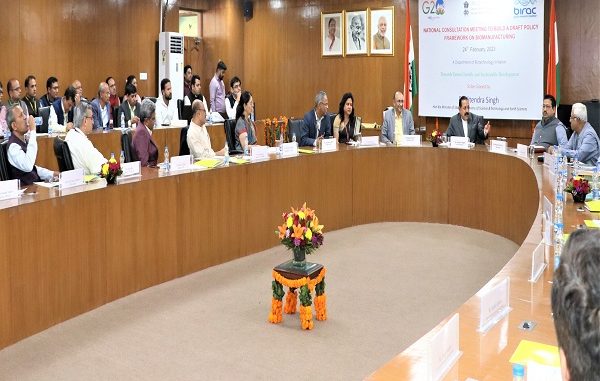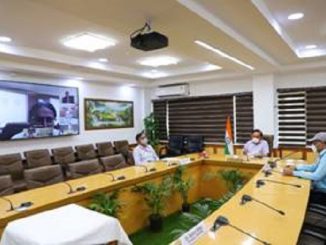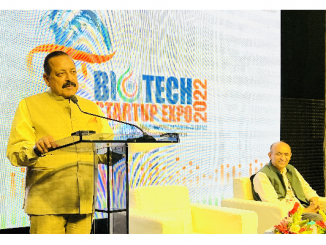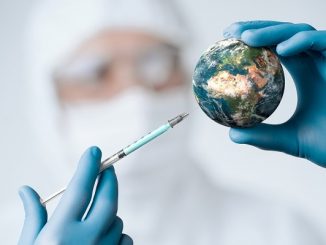
Feb 25: India’s bio-economy is poised to touch 300 billion USD (US Dollars) by 2030 and with its rising innovation and scientific temper, India is set to join the global wave of a new industrial revolution.
This was stated here today by Union Minister of State (Independent Charge) Science & Technology; Minister of State (Independent Charge) Earth Sciences; MoS PMO, Personnel, Public Grievances, Pensions, Atomic Energy and Space, Dr Jitendra Singh while speaking as chief guest at the “National Consultation Meeting on Bio-manufacturing to build a Draft Policy Framework on Bio-manufacturing”.
The Minister said, under Prime Minister Narendra Modi, the government is committed to enabling Circular-Bio-economy by advancing ‘High-Performance Bio-manufacturing’ in the country.
Dr Jitendra Singh said, the Department of Biotechnology (DBT) envisages bringing together scientific and technological advancement towards achieving a major goal of the Department’s vision of BioE3 (i.e. Biotechnology for Economy, Environment and Employment) for green, clean and prosperous India.
Dr Jitendra Singh said, India envisions “Green Growth” in the ensuing ‘AmritKaal’ and this calls for a systematic framework plan for the implementation of robust innovative bio-based eco-friendly solutions to further boost the ongoing economic growth of our nation. Additionally, “Mission LiFE” i.e, ‘Lifestyle for the Environment (LiFE)’ launched by Prime Minister Narendra Modi on 20th October 2022 urges us to put forward green and friendly environmental solutions in every aspect of life to effectively achieve climate and energy goals, the Minister added.
Dr Jitendra Singh also added that this program will strengthen ‘Make in India’ by supporting domestic manufacturing (Industry 4.0), as it will support building green infrastructure for bio-manufacturing across the country. Moreover, it will also lead to the development of a skilled workforce in the domain of Bio-manufacturing, a surge in job creation and entrepreneurship especially in 2- and 3-tier cities and streamline policies and regulations for Biogenic products to expand market opportunities. It will provide new opportunities for revenue generation to chemical businesses by manufacturing high-quality, recyclable goods from renewable resources, the Minister informed.
Dr Jitendra Singh said, Bio-manufacturing offers great potential by being amenable to innovation, energy efficient and causing reduced pollution, as it employs biological systems, including microbes, plant cells, and enzymes, to produce commercially relevant products. He pointed out that the backbone of this initiative comprises advanced tools of biotechnology including synthetic biology, genome editing, microbial bio-resources, metabolic engineering, etc.
In his address, Secretary, DBT, Dr Rajesh Gokhale said, India is the world’s 3rd largest importer of crude oil and the 4th largest importer of liquefied natural gas, a large part of which is used in chemical industrial manufacturing. He also added that the burning of hydrocarbons, the major constituent of fossil fuels, releases CO2 as a major by-product, contributing substantially to global warming. In the context of Prime Minister Modi’s vision to make India a ‘Net Zero’ carbon economy’ by 2027, we expect a paradigm shift towards a bio-based circular carbon economy, by adopting an integrated and inclusive approach to Bio-manufacturing, Dr Gokhale opined.
Dr Gokhale informed us that the pilot-scale based bio-manufacturing units will employ fermentation using enhanced microbial cell factories (and sugar/biomass/waste-based raw material) to manufacture bio-based products as an alternative to chemical products across various industrial sectors. Some of these sectors include food additives, biopharmaceuticals, biogenic dyes, bulk chemicals, animal feed products, flavours/fragrances, biomaterials, Agri-bio products, etc.
Dr Alka Sharma, Senior Advisor Department of Biotechnology (DBT) underlined that through this approach, an innovative ‘plug and play’ model of manufacturing for Industry 4.0 is being proposed. She said the backbone of this initiative comprises advanced tools of biotechnology including synthetic biology, genome editing, metabolic engineering, etc.
Dr Vaishali Panjabi, senior scientist in the DBT said while presenting an “Overview of the Biomanufacturing Program” that it has the potential to provide an alternative to traditional petrochemical-based manufacturing through the manufacture of biogenic products such as food additives, biopharmaceuticals, biogenic dyes, bulk chemicals, animal feed products, flavours/fragrances, biomaterials, Agri-bio product, etc. using sugar-based microbial fermentation and other sustainable biomass/waste resource-based manufacturing methods.
Disclaimer: We donot claim that the images used as part of the news published are always owned by us. From time to time, we use images sourced as part of news or any related images or representations. Kindly take a look at our image usage policy on how we select the image that are used as part of the news.


